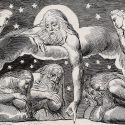Author: Fred Sanders
-
“Why So Much Preaching Is Lost Among Us”
The Puritan Isaac Ambrose (1604-1664) wrote a large book called Looking Unto Jesus. If I call it a devotional book, you’ll simply need to upgrade your notion of what a devotional book could be, or the condition to which all devotional books should aspire. Ambrose wrote it with the design of placing the mind of…
-
A Few Writing Tips
Some tips on writing that I posted on a friend’s blog back in 2010, but which have gone missing from the internet since then. Lightly revised and updated, they still represent my best advice about the craft of writing. 1. Read for craft. Once you’ve got it in your head that you want to be…
-
The Triune God: A Video Study
If you’d like to hear –nay, see— my lectures on The Triune God (Zondervan, 2016), then here’s some good news: we recorded them. Professionally produced, the brand new Video Study (also called The Triune God) features 2 hours and 35 minutes of me talking through the material that went into the book. It’s nine sessions…
-
Father and Son at the Cross
This is my last post in a series of theological preparations for Easter. The first post was about God experiencing death on the cross, and the second was about the two natures of Christ. I’m not trying to clutter up your Holy Week with theology homework. I hope you’ll be attending special services at church,…
-
How the Real Word Really Became Real Flesh
I’m no Bible Answer Man or anything, but I get a lot of questions around Easter time. How can God be unchanging if the Son became Jesus? What happened to the Trinity while the Son was dead? How could God the Father and God the Son be divided on the cross? How can you say…
-
God Died on the Cross
You may be looking for an earlier article with the same title. In the days leading up to Good Friday, I’m going to post a few theological answers to questions I get every year around this time. The answers will be unblushingly doctrinal, so prepare to put your thinking caps on. This little series isn’t…
-
New Essay, New Word
The new issue of the Journal of the Evangelical Theological Society is out, and it’s got plenty of Trinitarian theology in it. Don’t miss Scott Swain’s article on the Bible and the Trinity, and Gerald McDermott’s piece on the Trinity and world religions. It’s also got my article “Evangelical Trinitarianism and the Unity of the…
-
Grashop’s Bible Chart
I just came across this fascinating chart by T. Grashop. It’s printed in the front of the Geneva Bible, and it diagrams, using a tree of subdivisions, the way to read the Bible. There are seven steps, and they start as far back as “earnestly…pray unto God” that he will teach you, give you understanding,…
-
Deep Things of God, Second Edition
My 2010 book The Deep Things of God: How the Trinity Changes Everything, is coming out in a second edition in April 2017. Why? Because while the first edition has found a home in classrooms as well as churches, it contained a few obstacles that made it less useful than it could have been in…
-
“Something We Would Not Have the Right to Expect” [Video]
About six months ago I did a couple of interviews with the folks at Grace Communion (click here for the first one). The second and final episode is now available. In it, Mike Morrison asks me about two of my favorite, most Trinitarian subjects: adoption and prayer. Here’s an excerpt of what we discuss about…
-
Retrieving Eternal Generation
Scott Swain and I recently turned in the manuscript for a book called Retrieving Eternal Generation. It’s a collection of fifteen essays that we hope will go a long way toward securing Trinitarian theology’s classic form for contemporary theological work. The last few decades have seen a lot of loose talk about the doctrine of…
-

The Distinct God of the Book of Job
Robert Sokolowski has said that The Christian God is presented as being so transcendent to the world that he could be, in undiminished goodness and greatness, even if the world were not. The Christian God can be distinguished from the world in this radical way. … In contrast, the gods of pagan religion and the…